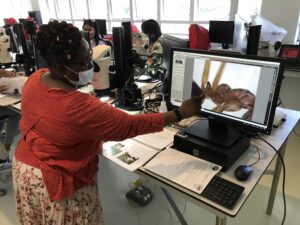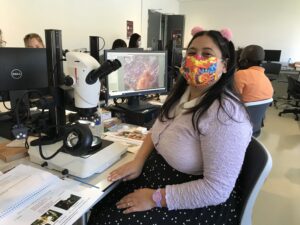In November 2021, a group of educators and environmental educators set out on an ‘ant-venture’ to learn about ants and how microscopy can enrich the process of learning in the classroom.
The series of two workshops, called An Afternoon with Ants, were co-hosted by Iziko South African Museum and the Iimbovane Project, and took place at the museum’s new Biodiversity Laboratory.
The workshops were designed to make the participants more proficient in microscopy but also to show them how to use ants as a tool for teaching concepts of biodiversity and biological classification.
Participants were talked through several worksheets – aimed at various schooling levels – where ants were used to explain a particular concept. This was followed by a lecture on ants, their ecology and diversity within Western Cape. MSc student Abusisiwe Ndaba from the University of Cape Town assisted for the day and shared some insights to her research on the revision of Anoplolepis species which is funded by the Foundational Biodiversity Information Programme (FBIP).
The diversity of ants was then further explored using the state-of-art Leica microscopes housed in the Biodiversity Laboratory which provided an unforgettable computer visualization experience.
Dr Robyn Payne (Demosponge Taxonomist at Iziko) introduced the group to the parts of the stereomicroscope and explained step-by-step how to use the different light sources and the focus and magnification functions.
For most participants, using the microscopes to look at the ants were an eye-opening experience.
“I can talk about ants, but actually seeing them under the microscope versus seeing it in a PowerPoint presentation is very different. It’s not quite the same as seeing it right under your nose and having to adjust the focus and magnification yourself.”
After a demonstration by Dr Charlene Janion-Scheepers (Lecturer at the University of Cape Town), participants were able to capture their own images of different ant species and to create labels on the images.
Participants also tried their hand at mounting ants. The activity started off with a lot of shaky hands but with a bit of patience, each participant left the workshop with two beautifully mounted ants.
One of the participants who attended the workshop Suanne Rampou, Deputy Chief Education Specialist: Natural Sciences at the Western Cape Education Department, commended Iziko and Iimbovane for the workshop saying it can improve educators and learners’ understanding of biological classification – a topic that are dealt with in Grade 7 and Grade 10.
“Classification is a challenging concept in the Grade 7 curriculum. The workshop demystified the concept and process of classification by using ant species. It can be useful to educators and learners and can be used for practical assignments and as part of formal assessments.”
The workshop was co-hosted by the Iziko South African Museum and the Iimbovane Project and was made possible through support from Rand Merchant Bank Fund.
 |
 |
|
Participants at the Afternoon with Ants workshop identifying different ant species in The Biodiversity Laboratory at the Iziko South African Museum, Cape Town. |
|